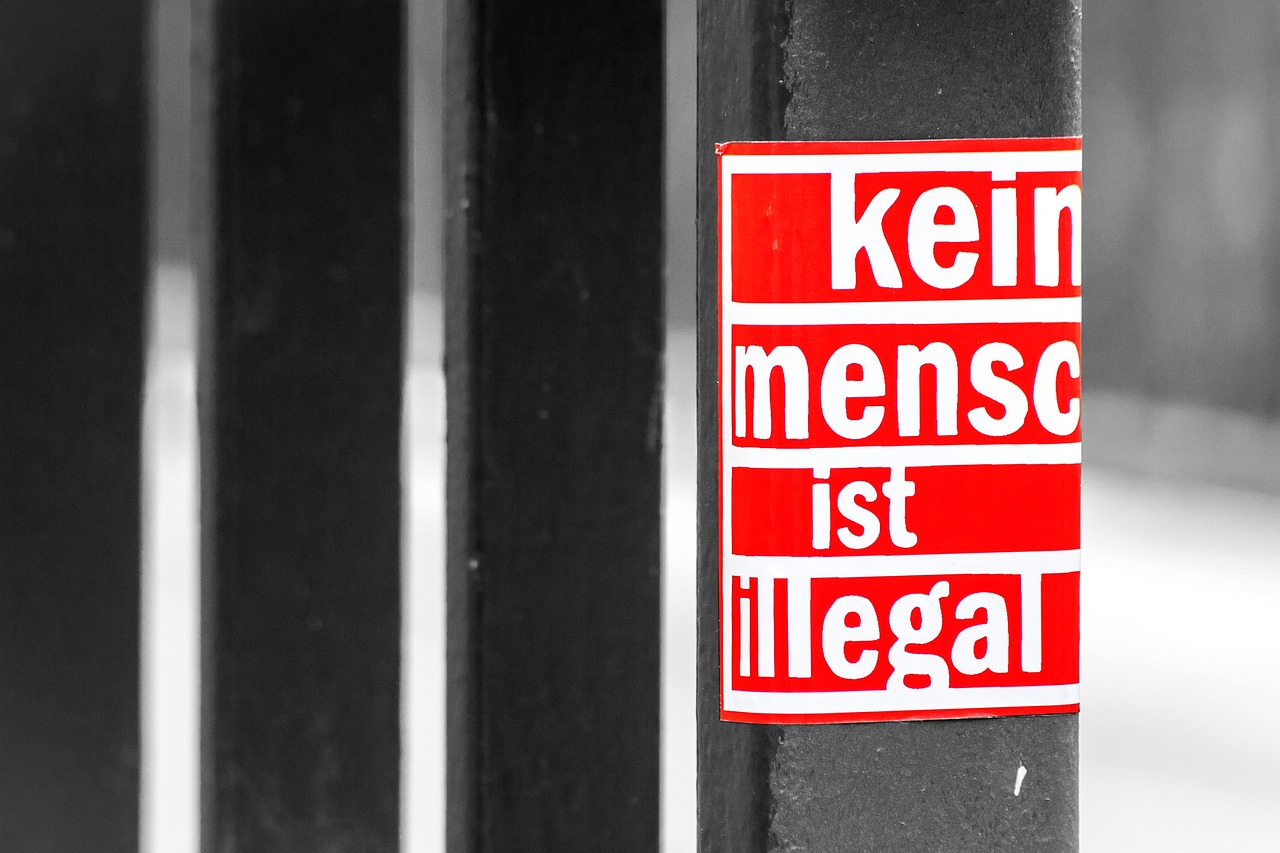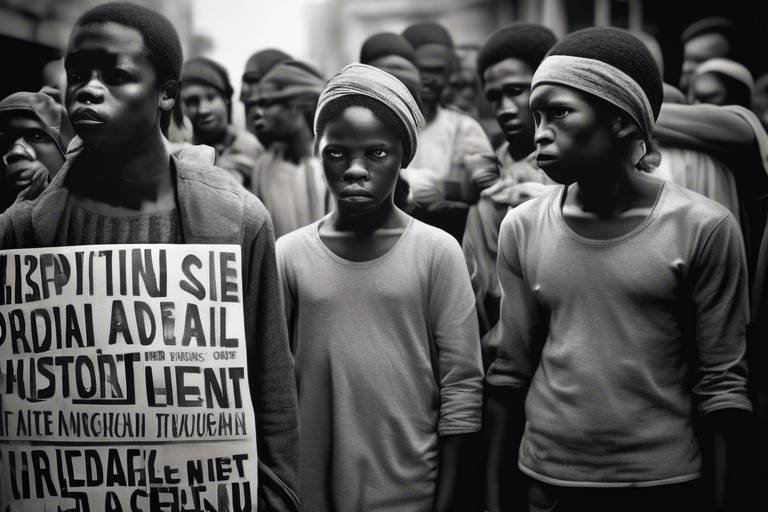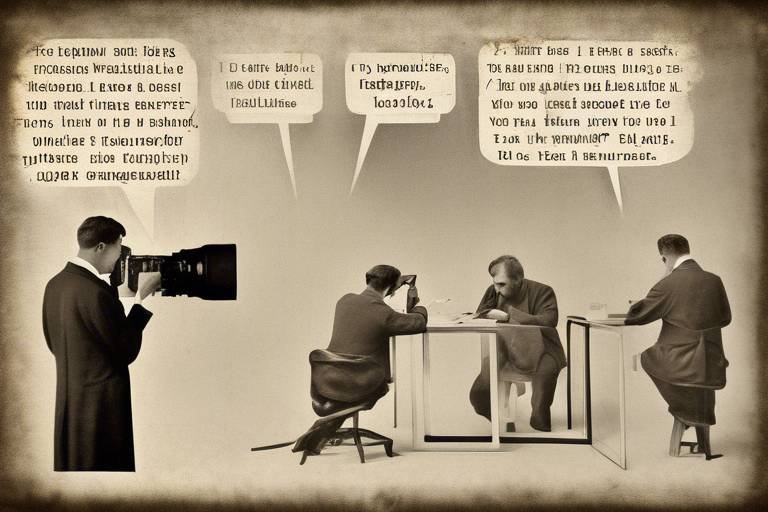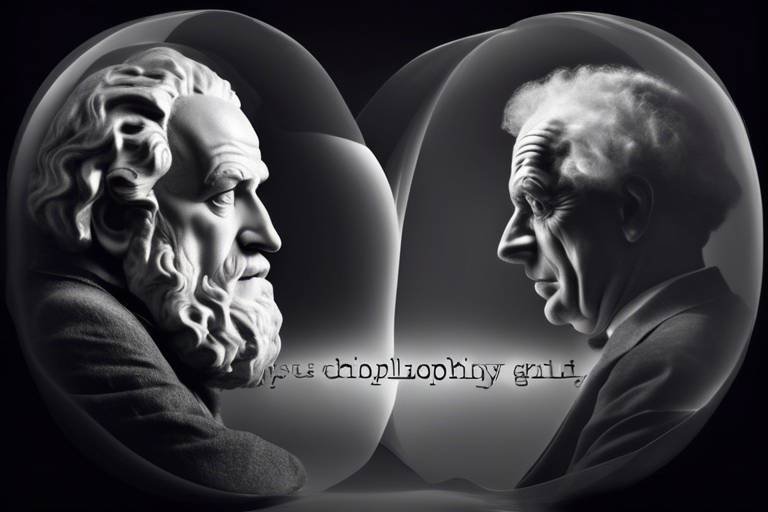Reflecting on the Philosophy of Human Rights
Human rights are more than just a collection of laws; they are the bedrock of our shared humanity. When we think about human rights, we're not merely engaging in a philosophical exercise; we're tapping into the very essence of what it means to be human. These rights are the moral compass that guides societies, ensuring that every individual is treated with dignity and respect. But where did these ideas come from? What makes them so significant in our contemporary world? Let's embark on a journey through the philosophical underpinnings of human rights, exploring their origins, significance, and the various perspectives that shape our understanding of human dignity and justice.
The roots of human rights can be traced back through centuries of philosophical thought and cultural evolution. Ancient civilizations, such as those in Greece and Rome, laid the groundwork for concepts of justice and individual rights. Thinkers like Plato and Aristotle pondered the nature of justice and the role of the individual within society. Fast forward to the Enlightenment, where philosophers like John Locke and Jean-Jacques Rousseau began to articulate ideas about natural rights and the social contract, emphasizing the importance of individual freedoms and the consent of the governed.
These foundational principles have evolved into modern declarations of human rights, such as the Universal Declaration of Human Rights (UDHR), adopted by the United Nations in 1948. This document encapsulates the belief that all humans are entitled to certain inalienable rights, regardless of nationality, culture, or religion. The significance of human rights lies in their ability to transcend borders and foster a sense of global solidarity, reminding us that we are all part of a larger human family.
Understanding human rights requires diving into several key philosophical theories that have shaped our discourse. These theories provide frameworks that inform our understanding of justice and individual freedoms. Among them, natural law theory, social contract theory, and utilitarianism stand out as prominent perspectives. Each of these theories offers unique insights into the nature of human rights and the moral obligations we owe to one another.
Natural law theory posits that human rights are derived from inherent human dignity, suggesting that these rights are universal and immutable. This means that no matter where you are or what laws govern you, your rights as a human being remain intact. Think of it as a moral GPS that guides us through the complexities of legal systems and societal norms.
Historically, thinkers like Aristotle and Aquinas laid the groundwork for understanding human rights as fundamental to human nature. Aristotle argued that humans are social beings, and thus, certain rights are essential for a flourishing life. Aquinas expanded on this by suggesting that natural law is a reflection of divine order, making human rights not just a social construct but a moral imperative.
In contemporary society, natural law principles are utilized by legal systems and human rights movements to advocate for justice and equality across diverse cultures. For instance, many activists draw upon natural law arguments when challenging oppressive regimes, asserting that fundamental human rights cannot be denied, regardless of the laws in place.
Social contract theory presents a framework where individuals consent to form societies, establishing rights and responsibilities. This theory is crucial for understanding political legitimacy and individual freedoms. Imagine society as a giant agreement where everyone plays their part, and in return, they receive the protection of their rights.
As we delve deeper into the philosophy of human rights, we encounter a significant debate: the tension between universal human rights and cultural relativism. This discussion is not merely academic; it has real-world implications for how we understand and implement human rights globally.
Proponents of universalism argue that human rights are inalienable and should apply to all individuals, regardless of cultural or societal context. They emphasize shared human dignity, advocating for a framework that transcends cultural differences. This perspective asserts that certain rights, such as the right to life and freedom from torture, are fundamental to all humans.
On the flip side, cultural relativists contend that human rights must be interpreted within specific cultural contexts. They advocate for an understanding that respects diverse traditions and values in defining rights. This perspective raises important questions: Can we impose a universal standard of rights on societies with different cultural backgrounds? Or should we adapt our understanding of rights to fit the unique contexts of each culture?
International law plays a crucial role in the promotion and enforcement of human rights. Key treaties and organizations, such as the United Nations, work tirelessly to establish standards and hold violators accountable. However, the path to justice is often fraught with challenges.
One of the pivotal international treaties is the Universal Declaration of Human Rights, which serves as a cornerstone for human rights advocacy worldwide. This document outlines fundamental rights that all humans are entitled to, regardless of their background. It represents a global commitment to protecting and promoting human rights across nations.
Despite the existence of international frameworks, challenges remain in the enforcement of human rights laws. Issues such as political resistance, lack of accountability, and varying interpretations across jurisdictions complicate the landscape. It's a bit like trying to enforce traffic laws in a city where everyone has their own rules—chaotic and often ineffective.
As we look to the future, the philosophy of human rights is evolving. Emerging issues such as technology, climate change, and global inequality present new challenges and opportunities for human rights discourse. How do we ensure that the rights of individuals are protected in an increasingly digital world? What responsibilities do we have to future generations in the face of climate change? These questions will shape the next chapter in the philosophy of human rights.
- What are human rights? Human rights are basic rights and freedoms that belong to every person, regardless of nationality, sex, ethnicity, or religion.
- Why are human rights important? They are essential for ensuring dignity, freedom, and justice for all individuals, forming the foundation of a fair society.
- How can we protect human rights? Through advocacy, education, and supporting international laws and treaties that promote and protect these rights.

The Origins of Human Rights
Understanding the origins of human rights is like peeling back the layers of an onion; each layer reveals a deeper insight into our collective humanity. The concept of human rights didn't just pop up overnight; it has roots that stretch back to ancient civilizations and philosophies. From the early codes of conduct in Mesopotamia to the philosophical musings of ancient Greece and Rome, the seeds of human rights were sown long before they blossomed into the modern framework we recognize today.
In ancient times, the idea of rights was often tied to the divine or natural order. For instance, the Code of Hammurabi from Babylon around 1754 BC established a set of laws that sought to protect the weak and ensure justice. This was a significant step toward recognizing that individuals had certain entitlements and protections, albeit within a very limited framework. Fast forward to ancient Greece, where philosophers like Socrates and Plato began to explore concepts of justice and morality, laying the groundwork for later discussions on human dignity.
The philosophical evolution continued with the emergence of Stoicism around the 3rd century BC, which emphasized the idea that all humans possess a rational nature and are thus deserving of respect and dignity. This notion was pivotal, as it suggested that rights were not merely granted by rulers or societies but were inherent to all individuals by virtue of their humanity. The Stoics believed that understanding our shared human condition could lead to a more just and equitable society.
As we move into the medieval period, thinkers like Thomas Aquinas began to weave together ideas of natural law and divine rights. Aquinas argued that human rights were part of a moral order that transcended human laws, suggesting that individuals have rights because they are created in the image of God. This perspective provided a moral foundation that would later influence the development of modern human rights declarations.
The Enlightenment era marked a significant shift in the discourse surrounding human rights. Philosophers like John Locke championed the idea of natural rights, asserting that life, liberty, and property were fundamental entitlements of all individuals. Locke's theories were revolutionary, emphasizing that governments were formed to protect these rights, and if they failed to do so, the people had the right to revolt. This line of thinking laid the groundwork for future democratic movements and the establishment of rights as a cornerstone of political legitimacy.
In the 18th century, the American Revolution and the French Revolution further propelled the idea of human rights into the global consciousness. The Declaration of Independence and the Declaration of the Rights of Man and of the Citizen articulated the belief that rights were universal and should be protected by the state. These documents echoed the sentiments of Enlightenment thinkers and marked a pivotal moment in the recognition of individual rights as fundamental to human dignity.
Fast forward to the 20th century, where the aftermath of the World Wars and the atrocities committed during these conflicts led to a renewed commitment to human rights on a global scale. The establishment of the United Nations and the adoption of the Universal Declaration of Human Rights in 1948 were monumental in codifying the belief that all individuals, regardless of their background, are entitled to certain inalienable rights. This declaration serves as a powerful reminder of our shared humanity and the moral obligation to protect each other's rights.
In conclusion, the origins of human rights are deeply rooted in our history, shaped by philosophical thought, social movements, and a collective desire for justice and dignity. As we reflect on these origins, we must recognize that the journey toward realizing human rights for all is ongoing. Each generation has the responsibility to uphold and advocate for these rights, ensuring that they remain a fundamental part of our global society.

Key Philosophical Theories
When it comes to understanding human rights, several philosophical theories stand out, each offering a unique lens through which we can examine the principles of justice and individual freedoms. These theories are not just academic musings; they form the backbone of our moral and ethical considerations in society today. Among the most influential are natural law theory, social contract theory, and utilitarianism. Each of these frameworks provides a distinct perspective on what rights are, where they come from, and how they should be applied.
Natural law theory proposes that human rights are inherent and derived from our very nature as human beings. Imagine a set of rights that are as fundamental as the air we breathe—these are rights that exist regardless of laws or societal norms. Thinkers like Aristotle and Aquinas have laid the groundwork for this theory, arguing that our moral compass is tied to our human dignity. This perspective suggests that rights are universal and immutable, making them a powerful tool for advocating justice and equality.
On the other hand, social contract theory presents a fascinating view of human rights as a product of collective agreement. Picture a group of individuals coming together to form a society, each consenting to certain rules and responsibilities in exchange for protection and order. This theory emphasizes the importance of political legitimacy and the idea that rights are not just given but are earned through mutual consent. It raises important questions: What happens when the social contract is broken? How do we hold governments accountable to uphold these rights?
Lastly, we have utilitarianism, which approaches human rights from a consequentialist angle. This theory suggests that the best action is the one that maximizes overall happiness or well-being. In this framework, rights may be seen as tools to achieve the greatest good for the greatest number. However, this perspective can lead to ethical dilemmas, especially when the rights of a minority are sacrificed for the majority's happiness. It prompts us to ask: is it ever justifiable to infringe upon individual rights for the sake of collective welfare?
To summarize, these key philosophical theories—natural law, social contract, and utilitarianism—each contribute to our understanding of human rights in profound ways. They challenge us to think critically about the nature of justice and the role of individuals within society. As we navigate the complexities of modern life, these theories serve as guiding stars, helping us to articulate and defend the rights that we hold dear.

Natural Law Theory
Natural law theory is a fascinating concept that suggests human rights are not just arbitrary rules created by societies, but rather fundamental rights that stem from our very nature as human beings. Imagine a world where rights are as intrinsic to us as the air we breathe; this is the essence of natural law. It implies that these rights are universal and immutable, meaning they exist regardless of the laws or customs of any particular society. The beauty of this theory lies in its assertion that every individual possesses inherent dignity, which cannot be stripped away by any government or authority.
Historically, the roots of natural law can be traced back to ancient philosophers, who pondered the nature of justice and morality. Thinkers like Aristotle and Aquinas significantly contributed to this discourse, laying a foundation that would influence generations to come. Aristotle introduced the idea that there are universal truths about human existence, while Aquinas expanded on this by arguing that human rights are derived from divine law. This philosophical lineage suggests that our rights are not merely social constructs but are grounded in a deeper moral reality.
In contemporary society, natural law continues to shape our understanding of justice and human rights. For instance, many human rights movements draw upon natural law principles to advocate for equality and justice across diverse cultures. The idea that all people possess certain inalienable rights has fueled movements for civil rights, gender equality, and more, proving that the philosophy of natural law is not just theoretical; it actively informs the fight for justice around the globe.
Consider the implications of natural law in modern legal systems. Courts often invoke natural law principles when making decisions that protect fundamental rights. This approach can be particularly powerful in situations where statutory laws may fall short of ensuring justice. By appealing to natural law, these legal systems affirm that some rights are so essential that they transcend local laws and cultural norms.
However, the application of natural law is not without its challenges. Critics argue that its abstract nature can lead to differing interpretations, creating tensions between various legal and cultural frameworks. Yet, this very tension is what makes the discourse around natural law so dynamic and vital. It invites us to continually reflect on what it means to be human and how we define our rights in a rapidly changing world.
In conclusion, natural law theory provides a powerful lens through which we can view human rights. It asserts that these rights are inherent to all individuals, grounded in our shared humanity. As we navigate the complexities of modern society, the principles of natural law remind us of the universal values that bind us together, urging us to advocate for justice and dignity for all.

Historical Context of Natural Law
The concept of natural law has deep roots in the philosophical traditions of ancient civilizations. Its origins can be traced back to thinkers such as Aristotle, who proposed that there are inherent laws governing human behavior that are discoverable through reason. Aristotle believed that these laws were universal, transcending individual cultures and societies. He posited that the essence of justice is rooted in the nature of human beings, which suggests that certain rights and moral principles are fundamental and should be recognized by all.
Building on Aristotle's ideas, the Roman philosopher Cicero further developed the notion of natural law, asserting that it is a reflection of divine reason. He argued that true law is right reason in agreement with nature, and that it is applicable to all people at all times. This idea laid a foundational stone for later thinkers, particularly during the medieval period, when Thomas Aquinas synthesized Aristotelian philosophy with Christian theology. Aquinas asserted that natural law is part of God's eternal law and is accessible through human reason, thus providing a moral framework that guides human behavior and legislation.
As we moved into the modern era, the Enlightenment brought about a significant shift in the understanding of natural law. Philosophers like John Locke and Jean-Jacques Rousseau emphasized the importance of individual rights and the social contract. Locke, in particular, argued that individuals possess natural rights to life, liberty, and property, which governments are obliged to protect. This perspective significantly influenced the development of democratic societies and the framing of human rights as we understand them today.
In contemporary discussions, natural law continues to play a vital role in shaping our understanding of human rights. It serves as a moral compass that informs legal and ethical standards across cultures. For instance, many international human rights instruments draw upon the principles of natural law to assert that certain rights are inalienable and universal. The enduring legacy of natural law philosophy demonstrates its relevance in addressing modern issues such as social justice, equality, and human dignity.
To summarize the historical context of natural law, we can look at a brief timeline of key thinkers and their contributions:
| Philosopher | Key Contribution | Era |
|---|---|---|
| Aristotle | Introduced the idea of inherent laws governing human behavior. | 4th Century BC |
| Cicero | Defined true law as right reason in agreement with nature. | 1st Century BC |
| Thomas Aquinas | Synthesized natural law with Christian theology; emphasized moral framework. | 13th Century AD |
| John Locke | Argued for natural rights to life, liberty, and property. | 17th Century AD |
| Jean-Jacques Rousseau | Emphasized the social contract and the importance of individual rights. | 18th Century AD |
In conclusion, the historical context of natural law reveals its evolution from ancient philosophies to modern interpretations that continue to shape our understanding of human rights. By recognizing the contributions of these key thinkers, we can appreciate the enduring significance of natural law in promoting justice and human dignity across the globe.
- What is natural law? Natural law refers to a set of inherent rights and moral principles that are universally applicable to all human beings, regardless of societal laws.
- Who were the key philosophers of natural law? Key philosophers include Aristotle, Cicero, Thomas Aquinas, John Locke, and Jean-Jacques Rousseau.
- How does natural law relate to human rights? Natural law serves as a foundational principle for many modern human rights theories, asserting that certain rights are inalienable and universal.
- Why is natural law still relevant today? Natural law provides a moral framework that guides legal and ethical standards, helping to address contemporary issues of justice and equality.

Modern Applications of Natural Law
In today’s world, the principles of natural law resonate through various legal systems and human rights movements, acting as a beacon for justice and equality. The beauty of natural law lies in its assertion that certain rights are inherent and universal, transcending borders and cultures. This philosophy has found its way into modern legislation, influencing how societies perceive and implement justice. For instance, many democratic nations have embedded natural law principles into their constitutions, ensuring that the rights to life, liberty, and the pursuit of happiness are protected as fundamental human rights.
Moreover, the application of natural law is evident in the advocacy work done by numerous organizations around the globe. Groups such as Amnesty International and Human Rights Watch draw upon natural law to argue against injustices, emphasizing that every individual possesses certain inalienable rights simply by virtue of being human. Their campaigns often highlight cases where governments violate these rights, using natural law as a framework to demand accountability and reform.
One of the most significant modern applications of natural law can be seen in the realm of international human rights law. The Universal Declaration of Human Rights (UDHR), adopted by the United Nations in 1948, is a testament to the enduring influence of natural law. The UDHR outlines a set of rights that are considered inherent to all human beings, regardless of nationality, ethnicity, or religion. This document serves as a foundation for many international treaties and national laws, reinforcing the idea that natural rights are not granted by governments but are inherent to all individuals.
Additionally, the principles of natural law are increasingly relevant in discussions surrounding social justice and environmental rights. As the world grapples with issues like climate change and inequality, advocates argue that the right to a healthy environment is a natural right that must be recognized and protected. This perspective aligns with the idea that humans have a moral obligation to protect the planet, as it is essential for the survival and dignity of future generations.
In conclusion, the modern applications of natural law continue to evolve, influencing legal frameworks and societal norms. As we navigate the complexities of contemporary issues, the relevance of natural law remains a guiding principle, reminding us that at the core of all rights is the fundamental respect for human dignity. The challenge, however, lies in ensuring that these principles are upheld in practice, fostering a world where justice and equality are not just ideals but lived realities for all.
- What is natural law? Natural law is a philosophical belief that certain rights are inherent to all humans and not contingent on laws or customs.
- How does natural law influence modern legal systems? Many legal systems incorporate natural law principles to ensure the protection of fundamental human rights.
- What are some examples of natural law in action today? Organizations advocating for human rights and environmental justice often rely on natural law principles to argue for the protection of these rights.
- Is natural law universally accepted? While many agree on its importance, interpretations of natural law can vary across different cultures and legal systems.

Social Contract Theory
Social contract theory is a fascinating framework that helps us understand the foundations of society and governance. Imagine a time before governments existed, where individuals roamed freely, but chaos reigned supreme. In this state of nature, life was often described as "solitary, poor, nasty, brutish, and short," as noted by philosopher Thomas Hobbes. To escape this turmoil, individuals came together, forming a social contract—a mutual agreement to create a structured society where rights and responsibilities are defined.
This theory suggests that individuals consent, either explicitly or implicitly, to surrender some of their freedoms in exchange for the protection of their remaining rights. It's like trading a few coins for a ticket to a concert; you give up a little to gain a lot more in return. In essence, the social contract lays the groundwork for political legitimacy and individual freedoms, creating a balance between personal liberty and societal order.
Different philosophers have approached the concept of social contract theory in unique ways. For instance, Hobbes believed that an absolute sovereign was necessary to maintain peace and prevent a return to chaos. In contrast, John Locke argued for a government with limited powers, emphasizing that individuals retain certain inalienable rights, such as life, liberty, and property. This divergence illustrates how the social contract can shape varying political ideologies and systems.
Furthermore, Jean-Jacques Rousseau introduced a revolutionary idea that the social contract should be based on the general will of the people. He believed that true freedom is achieved when individuals participate in the governance process, aligning their personal interests with the collective good. This notion has profound implications for democratic societies, where the voice of the people is paramount.
To summarize, social contract theory serves as a critical lens through which we can examine the legitimacy of governments and the rights of individuals. It raises essential questions: What is the role of government? How do we balance individual freedoms with societal needs? These inquiries remain relevant today as we navigate complex social and political landscapes.

Universal vs. Cultural Relativism
The debate between universal human rights and cultural relativism is a fascinating and complex one, often sparking intense discussions among scholars, activists, and policymakers alike. At its core, this discourse questions whether human rights should be seen as universally applicable to all individuals, regardless of their cultural background, or whether they should be interpreted through the lens of specific cultural contexts. This tension is not merely academic; it has real-world implications for how we understand justice, equality, and human dignity across different societies.
Proponents of universalism argue that human rights are inherent to all people, grounded in the shared dignity of humanity itself. They believe that certain rights, such as the right to life, freedom of expression, and the right to education, transcend cultural boundaries and should be recognized and protected everywhere. This perspective is often supported by international treaties and declarations, such as the Universal Declaration of Human Rights (UDHR), which was adopted by the United Nations in 1948. Advocates of universalism contend that these rights are inalienable and must be upheld regardless of local customs or practices.
On the other hand, cultural relativists argue that human rights cannot be universally applied without considering the unique traditions, values, and social norms of different cultures. They assert that imposing a singular framework of rights can lead to cultural imperialism, where the dominant cultures overshadow and invalidate the practices and beliefs of others. For cultural relativists, understanding human rights requires a nuanced approach that respects the diversity of human experiences and acknowledges that what may be considered a right in one culture might not hold the same significance in another.
This debate raises critical questions about how we define rights and who gets to decide what is right or wrong. For instance, consider the following points:
- Shared Human Dignity: Universalists emphasize that all humans deserve dignity, which should be the foundation of human rights.
- Cultural Significance: Cultural relativists highlight that practices, such as gender roles or family structures, may have deep-rooted significance that should be respected.
- Global Advocacy: The universalist approach often leads to global advocacy efforts that aim to standardize rights, while cultural relativism promotes localized solutions.
Ultimately, the challenge lies in finding a balance between these two perspectives. Acknowledging the validity of cultural contexts while advocating for fundamental human rights can lead to a more comprehensive understanding of justice. As we navigate this complex landscape, it is essential to engage in open dialogues that consider both universal principles and cultural nuances, fostering a more inclusive approach to human rights.
- What is the main difference between universalism and cultural relativism?
Universalism advocates for the application of the same human rights standards globally, while cultural relativism argues that rights should be interpreted based on cultural contexts. - Can human rights be universal if cultures differ significantly?
This is a contentious issue, as some argue that fundamental rights, like the right to life, should be universal, whereas others believe that cultural perspectives must inform our understanding of rights. - How do international treaties address the conflict between universalism and cultural relativism?
International treaties, like the UDHR, aim to establish common standards while also recognizing the importance of cultural contexts in the implementation of these rights.

Arguments for Universalism
When we dive into the world of human rights, one of the most compelling arguments is the notion of universalism. This perspective boldly asserts that human rights are not just privileges granted by governments or cultures, but rather inherent rights that belong to every individual by virtue of being human. Imagine a world where these rights are as fundamental as breathing—this is the essence of universalism. It emphasizes that rights should transcend borders, cultures, and societal norms, creating a common ground for all of humanity.
Proponents of universalism argue that human rights are inalienable, meaning they cannot be taken away or transferred. This idea is rooted in the belief that every person deserves to live with dignity, free from oppression and injustice. For instance, consider the right to life. This is not just a legal stipulation; it is a fundamental aspect of human existence. When we say that everyone has a right to life, we are affirming that no one should be subjected to violence or discrimination, regardless of where they come from or what culture they belong to.
Another compelling argument for universalism is the shared human experience. Throughout history, people have faced similar struggles—be it war, famine, or persecution. These shared experiences create a tapestry of human suffering and resilience that transcends cultural boundaries. By recognizing that we all face challenges, we can unite under a common framework of rights that protect us all. This is not merely an idealistic view; it’s a practical approach to fostering global solidarity and cooperation.
Moreover, universalism is supported by numerous international treaties and declarations, such as the Universal Declaration of Human Rights (UDHR). Adopted in 1948, the UDHR serves as a foundational document that outlines the rights every human being is entitled to, regardless of nationality, ethnicity, or religion. It is a testament to the global consensus that certain rights are essential for a just and equitable society. The UDHR has inspired countless movements and legal frameworks worldwide, reinforcing the idea that human rights are a universal concern.
However, the push for universalism does face challenges. Critics argue that imposing a universal standard may overlook the nuances of cultural contexts. They contend that human rights should be interpreted through the lens of local traditions and values. Yet, universalists respond by emphasizing that while cultural practices may vary, the fundamental rights to dignity and justice should remain constant. In this light, universalism does not seek to erase cultural identities but rather to ensure that these identities do not come at the expense of basic human rights.
In conclusion, the arguments for universalism resonate deeply in a world that is increasingly interconnected. As we navigate complex global issues, from refugee crises to climate change, the need for a shared understanding of human rights becomes ever more critical. By embracing universalism, we not only affirm the dignity of every individual but also pave the way for a more just and equitable world. After all, when we stand together for human rights, we stand together for humanity itself.
- What are human rights? Human rights are basic rights and freedoms that belong to every person in the world, from birth until death. They apply regardless of nationality, sex, ethnic origin, religion, language, or any other status.
- Why are human rights universal? Human rights are considered universal because they are inherent to all human beings, regardless of cultural or societal differences. They reflect a common understanding of what it means to live with dignity.
- How can we promote universal human rights? Promoting universal human rights involves education, advocacy, and the support of international treaties and organizations that uphold these rights globally.

Cultural Relativist Perspectives
The debate surrounding human rights often brings us to a crossroads between universalism and cultural relativism, a tension that is both fascinating and crucial. Cultural relativism posits that human rights cannot be universally applied without considering the unique cultural contexts from which they arise. This perspective argues that what is deemed a right in one culture may not hold the same significance in another. For instance, while freedom of speech is a cornerstone of many Western societies, other cultures may prioritize communal harmony over individual expression. This divergence raises the question: can we truly claim to understand human rights without acknowledging the rich tapestry of cultural beliefs and practices?
Cultural relativists emphasize that rights should be interpreted through the lens of local customs, traditions, and values. They argue that imposing a universal standard can lead to cultural imperialism, where dominant cultures impose their ideals on others, often disregarding the intricate social fabrics of diverse societies. To illustrate this point, consider the following:
| Aspect | Universalism | Cultural Relativism |
|---|---|---|
| Definition of Rights | Inalienable and universal | Context-dependent and variable |
| Approach to Enforcement | Global standards applied universally | Respect for local customs and practices |
| Potential Issues | Cultural imperialism | Possible neglect of fundamental rights |
Moreover, cultural relativism encourages us to engage in dialogue rather than impose solutions. It invites us to listen, learn, and adapt our understanding of rights in ways that honor the dignity and values of local communities. This approach can be particularly beneficial in international human rights discussions, where the goal should be to foster mutual respect and understanding rather than to dictate terms from a position of power.
However, critics of cultural relativism argue that it can lead to the justification of practices that violate basic human rights, such as gender discrimination or child marriage, under the guise of cultural preservation. This dilemma poses a significant challenge: how do we balance respect for cultural diversity with the imperative to uphold fundamental human rights? The answer may lie in finding common ground, where cultural practices are respected, yet fundamental rights are protected. Engaging local leaders and communities in these discussions can foster a more inclusive approach to human rights, one that respects cultural context while advocating for justice and equality.
In conclusion, cultural relativist perspectives remind us that human rights are not a one-size-fits-all concept. They compel us to question our assumptions and to appreciate the complexity of human dignity across different cultures. As we navigate this intricate landscape, it is essential to approach the discourse with humility and an open mind, recognizing that our understanding of rights is continually evolving. This ongoing dialogue can lead to a richer, more nuanced appreciation of what it means to be human in a diverse world.
- What is cultural relativism? Cultural relativism is the idea that a person's beliefs and activities should be understood based on that person's own culture, rather than be judged against the criteria of another culture.
- How does cultural relativism impact human rights? It challenges the notion of universal human rights by suggesting that rights and values are culturally specific and should be interpreted within their cultural context.
- Can cultural relativism lead to violations of human rights? Yes, critics argue that cultural relativism can be used to justify practices that may violate fundamental human rights, such as discrimination or violence.
- How can we reconcile cultural relativism with human rights? By promoting dialogue and understanding, we can respect cultural differences while advocating for fundamental rights that protect individual dignity.

The Role of International Law
International law plays a crucial role in shaping the landscape of human rights across the globe. It serves as a framework that not only defines what constitutes human rights but also establishes mechanisms for their protection and enforcement. This framework is essential because, without it, the lofty ideals of human rights could easily fall victim to the whims of individual nations or powerful entities. Imagine trying to play a game without any rules; chaos would ensue, and the fundamental rights of individuals would be at the mercy of those in power.
One of the cornerstones of international human rights law is the Universal Declaration of Human Rights (UDHR), adopted by the United Nations General Assembly in 1948. This landmark document outlines a broad range of rights and freedoms that are to be universally protected. It emphasizes that all human beings are born free and equal in dignity and rights, setting a global standard that nations are encouraged to follow. The UDHR has inspired more than 500 international treaties, conventions, and declarations aimed at protecting human rights, highlighting its significance as a foundational text.
In addition to the UDHR, various international treaties have been established to address specific rights and issues. For instance, the International Covenant on Civil and Political Rights (ICCPR) and the International Covenant on Economic, Social and Cultural Rights (ICESCR) are two key treaties that further elaborate on the rights enshrined in the UDHR. These treaties create binding obligations for the countries that ratify them, thus providing a legal basis for holding governments accountable for human rights violations.
| Treaty | Year Adopted | Main Focus |
|---|---|---|
| Universal Declaration of Human Rights (UDHR) | 1948 | Fundamental human rights |
| International Covenant on Civil and Political Rights (ICCPR) | 1966 | Civil and political rights |
| International Covenant on Economic, Social and Cultural Rights (ICESCR) | 1966 | Economic, social, and cultural rights |
However, the enforcement of international human rights law is fraught with challenges. While treaties and declarations provide a framework, actual enforcement often hinges on the political will of individual states. For example, countries may ratify treaties but fail to implement them domestically due to various reasons, including lack of resources, political instability, or outright resistance from those in power. This discrepancy between international commitments and domestic practices raises important questions about accountability and the effectiveness of international law in protecting human rights.
Moreover, organizations like the United Nations Human Rights Council and various non-governmental organizations (NGOs) play vital roles in monitoring compliance and advocating for victims of human rights abuses. These entities often serve as watchdogs, bringing attention to violations and pressuring governments to uphold their commitments. Yet, despite their efforts, the path to justice is often long and arduous, leaving many individuals vulnerable to abuse.
In conclusion, while international law provides a necessary structure for the promotion and protection of human rights, its effectiveness is heavily influenced by the commitment of individual nations and the global community. As we navigate the complexities of human rights in an increasingly interconnected world, the role of international law will continue to evolve, adapting to new challenges and striving to uphold the dignity and rights of all individuals.
- What is the Universal Declaration of Human Rights (UDHR)? The UDHR is a milestone document in the history of human rights, adopted by the United Nations General Assembly in 1948, outlining fundamental rights that should be universally protected.
- How do international treaties enforce human rights? International treaties create binding obligations for countries that ratify them, allowing for legal accountability in cases of human rights violations.
- What challenges exist in enforcing international human rights law? Challenges include political resistance, lack of resources, and the gap between international commitments and domestic implementation.

Key International Treaties
When we talk about human rights on a global scale, it's impossible to ignore the pivotal role that international treaties play. These documents are not just ink on paper; they represent a collective commitment from nations around the world to uphold the dignity and rights of every individual. One of the most significant treaties is the Universal Declaration of Human Rights (UDHR), adopted by the United Nations General Assembly in 1948. This landmark document outlines fundamental human rights that are universally protected and serves as a foundation for international human rights law.
The UDHR consists of 30 articles that cover a broad range of rights, from the right to life and liberty to the right to education and work. It emphasizes that all human beings are born free and equal in dignity and rights, establishing a common standard for all nations to aspire to. But the UDHR is just the beginning. Over the years, various treaties have been established to further elaborate on specific rights and address particular issues. Here are some key treaties that continue to shape the landscape of human rights:
| Treaty | Year Adopted | Focus Area |
|---|---|---|
| International Covenant on Civil and Political Rights (ICCPR) | 1966 | Protects civil and political rights |
| International Covenant on Economic, Social and Cultural Rights (ICESCR) | 1966 | Protects economic, social, and cultural rights |
| Convention on the Elimination of All Forms of Discrimination Against Women (CEDAW) | 1979 | Promotes women's rights and gender equality |
| Convention on the Rights of the Child (CRC) | 1989 | Protects children's rights |
| Convention on the Rights of Persons with Disabilities (CRPD) | 2006 | Promotes the rights of persons with disabilities |
These treaties not only provide a framework for protecting human rights but also hold governments accountable for their obligations. However, the effectiveness of these treaties often hinges on the commitment of individual countries to implement and enforce them. This leads us to a crucial point: while treaties set standards, the real challenge lies in ensuring compliance and addressing violations when they occur.
The role of international organizations, such as the United Nations and various non-governmental organizations (NGOs), is vital in monitoring compliance and advocating for those whose rights are violated. They help to shine a light on abuses and push for accountability, often putting pressure on governments to adhere to their commitments. Yet, the road to universal human rights is fraught with challenges, including political resistance and differing interpretations of what constitutes a violation.
As we look to the future, it is clear that international treaties will continue to be crucial in the ongoing fight for human rights. They not only serve as legal instruments but also as moral compasses guiding nations toward a more just and equitable world. However, the effectiveness of these treaties will depend on our collective resolve to uphold the principles they enshrine and to ensure that human rights are not just theoretical ideals but practical realities for everyone, everywhere.
- What is the Universal Declaration of Human Rights?
The UDHR is a foundational document that outlines the basic rights and freedoms to which all humans are entitled. - How do international treaties enforce human rights?
International treaties set standards for human rights, and organizations monitor compliance, advocating for victims of violations. - Are there consequences for countries that violate human rights treaties?
While there can be diplomatic and economic repercussions, enforcement varies significantly depending on the political context.

Challenges in Enforcement
The enforcement of human rights laws is a complex issue fraught with challenges that often impede the realization of fundamental rights for individuals worldwide. Despite the existence of robust international frameworks, such as the Universal Declaration of Human Rights, the reality on the ground often tells a different story. One of the primary obstacles is political resistance. Governments may be reluctant to implement international standards, particularly if they perceive these standards as a threat to their sovereignty or power. This resistance can manifest in various ways, from outright denial of rights to the selective application of laws that favor certain groups over others.
Another significant challenge is the lack of accountability. Many nations sign treaties and conventions but fail to hold themselves accountable for their obligations. This lack of accountability can stem from a variety of factors, including corruption within governmental structures, a weak judiciary, or simply a lack of political will. For instance, in countries where the rule of law is weak, individuals may have little recourse when their rights are violated, leading to a culture of impunity.
Moreover, the varying interpretations of human rights laws across different jurisdictions complicate enforcement efforts. What one country views as a violation of human rights, another might consider an acceptable practice. This discrepancy can lead to confusion and inconsistency in the application of human rights standards. For example, issues such as freedom of speech, gender equality, and rights for marginalized communities can be interpreted very differently based on cultural, social, and political contexts.
In addition to these challenges, the rise of new technologies presents both opportunities and hurdles for human rights enforcement. While technology can facilitate the spread of information and mobilization of advocacy efforts, it can also be used as a tool for surveillance and oppression. Governments may employ technology to monitor dissent and suppress free expression, thereby undermining the very rights that international laws seek to protect.
Lastly, the challenge of global inequality cannot be overlooked. Economic disparities between nations often result in unequal access to justice and human rights protections. Countries with fewer resources may struggle to implement and enforce human rights laws effectively, leaving vulnerable populations at greater risk of exploitation and abuse. This inequality raises critical questions about the universality of human rights and whether they can truly be upheld in a world marked by such stark disparities.
In summary, while international human rights frameworks provide a vital foundation for protecting individual rights, the challenges in enforcement are significant and multifaceted. Addressing these challenges requires a concerted effort from all stakeholders, including governments, international organizations, and civil society, to ensure that human rights are not just words on paper but lived realities for all individuals.
- What are the main challenges in enforcing human rights? Political resistance, lack of accountability, varying interpretations of laws, the impact of technology, and global inequality are some of the key challenges.
- How does political resistance affect human rights enforcement? Governments may resist implementing international standards, viewing them as threats to sovereignty, which hampers the realization of rights.
- Why is accountability important in human rights enforcement? Without accountability, nations may ignore their obligations, leading to a culture of impunity where rights violations go unpunished.
- How do technology and human rights intersect? Technology can both promote and hinder human rights; it can facilitate advocacy but also enable surveillance and repression.
- What role does global inequality play in human rights? Economic disparities can limit access to justice and effective enforcement of human rights laws, particularly in less developed countries.

The Future of Human Rights Philosophy
The philosophy of human rights is not static; it evolves with the changing tides of society, technology, and global issues. As we look to the future, we find ourselves at a crossroads, where traditional notions of human rights must adapt to new challenges that threaten our shared humanity. One of the most pressing issues is the impact of technology. With the rise of artificial intelligence and digital surveillance, the question arises: how do we protect individual rights in a world where privacy is increasingly compromised? The very fabric of human rights is being tested as we navigate this digital landscape.
Moreover, the looming threat of climate change adds another layer of complexity to human rights discussions. Environmental degradation disproportionately affects vulnerable populations, raising crucial questions about the right to a safe and healthy environment. As natural disasters become more frequent and severe, the idea of environmental justice is gaining traction, urging us to rethink our responsibilities towards both people and the planet. How do we reconcile the right to development with the need to protect our environment? This dilemma underscores the interconnectedness of human rights and environmental sustainability.
Global inequality is yet another critical factor that will shape the future of human rights philosophy. The gap between the rich and the poor continues to widen, exacerbating social tensions and undermining the principles of justice and equality. As we strive for a more equitable world, we must question the effectiveness of current human rights frameworks. Are they sufficient to address the systemic injustices that perpetuate poverty and disenfranchisement? This leads us to consider innovative solutions that go beyond traditional human rights discourse, incorporating economic, social, and cultural rights into the conversation.
As we ponder these challenges, it is essential to foster a dialogue that includes diverse voices from around the globe. Human rights are not a one-size-fits-all concept; they must be contextualized within different cultural frameworks. The future of human rights philosophy hinges on our ability to balance universal principles with respect for local traditions and values. This approach requires us to listen, learn, and adapt our understanding of rights to reflect the realities of various communities.
In conclusion, the future of human rights philosophy is a dynamic and multifaceted landscape. It calls for an ongoing examination of how we define, protect, and promote rights in an ever-changing world. As we move forward, we must embrace a holistic approach that considers the interplay between technology, the environment, and social justice. Only then can we hope to create a world where human rights are truly universal and accessible to all.
- What are the main challenges facing human rights today?
The main challenges include the impact of technology, climate change, and global inequality, which all require a re-evaluation of traditional human rights frameworks.
- How does technology affect human rights?
Technology, particularly digital surveillance and artificial intelligence, poses risks to privacy and individual freedoms, necessitating new protections and regulations.
- What role does culture play in understanding human rights?
Cultural context is crucial in defining and interpreting human rights, as it helps to respect diverse traditions while promoting universal principles.
- Can human rights be universal?
While many advocate for universal human rights, it is essential to consider cultural relativism, ensuring that rights are applicable and respectful of local contexts.
Frequently Asked Questions
- What are the origins of human rights?
Human rights have a rich history that dates back to ancient philosophies. They evolved over time, influenced by various thinkers and movements. The concept of human rights emerged as a response to injustices, with foundational principles rooted in the belief of inherent human dignity.
- How do philosophical theories inform our understanding of human rights?
Philosophical theories like natural law, social contract theory, and utilitarianism provide frameworks for understanding the nature and significance of human rights. For instance, natural law suggests that rights are universal and inherent to all humans, while social contract theory emphasizes the agreement among individuals to form societies and establish rights.
- What is the difference between universalism and cultural relativism in human rights?
Universalism advocates that human rights are inalienable and should apply to everyone, regardless of cultural context. In contrast, cultural relativism argues that rights should be understood within specific cultural frameworks, respecting diverse traditions and values. This debate is crucial in shaping global human rights discourse.
- What role does international law play in human rights?
International law plays a vital role in promoting and protecting human rights globally. Key treaties, like the Universal Declaration of Human Rights, establish standards that nations agree to uphold. However, challenges in enforcement persist, including political resistance and varying interpretations of these laws.
- What are some emerging issues affecting the future of human rights?
The landscape of human rights is continually evolving, especially with the rise of technology, climate change, and global inequality. These issues pose new challenges and require innovative approaches to ensure that human rights are respected and upheld for all individuals in a rapidly changing world.



















